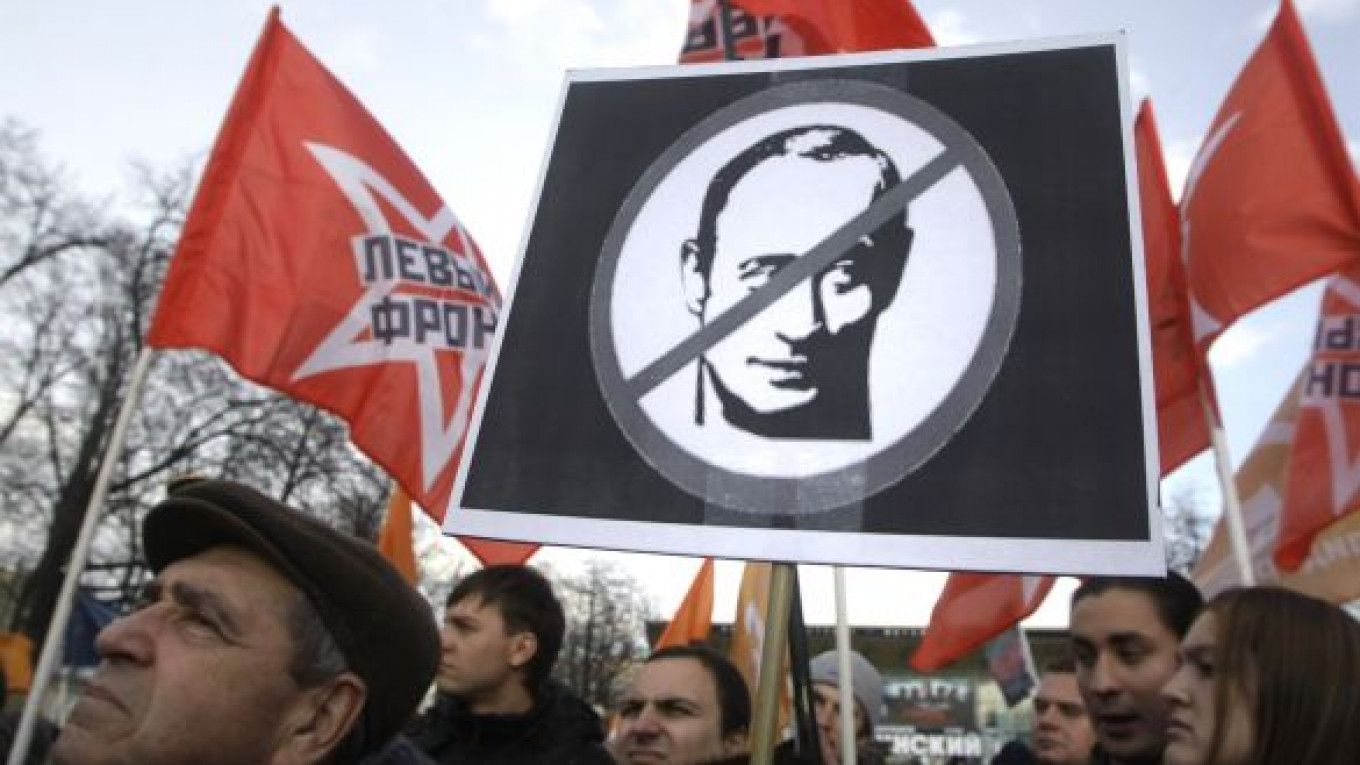A crowd of up to 2,000 gathered on Pushkin Square on Saturday to demand the ouster of Prime Minister Vladimir Putin and his Cabinet — just as the State Duma tightened the screws on legislation on protests.
The rally, staged two days after Mayor Sergei Sobyanin took office, became one of the largest political rallies to be sanctioned by city authorities in recent years.
“Demands for Putin's resignation have been voiced at rallies before, but this time it was the main slogan,” rights champion Lev Ponomaryov, who took part in the event, told The Moscow Times on Sunday.
The protesters accused Putin's government of having a poor record on social policies and preserving political freedoms, as well as failing to prevent last summer's devastating wildfires. They also demanded the release of jailed former Yukos CEO Mikhail Khodorkovsky and his business partner Platon Lebedev.
Chess champion-turned-opposition politician Garry Kasparov and Khimki forest defender Yevgenia Chirikova were among the speakers at the rally, which was staged by a recently created union of Kasparov's United Civil Front and several leftist public groups.
Moscow police said only 300 people took part in the rally, RIA-Novosti reported. But photos from the site challenged the figure, and Ponomaryov put the number of participants between 1,500 and 2,000.
He also said he suspected that the rally had been authorized because the new mayor was seeking a temporary “compromise” that would allow him to judge the strength of the opposition.
“This was their wait-and-see moment. They wanted to see how many people would come in order to decide what further actions to take,” Ponomaryov said about the city authorities.
Sobyanin made no public comments about the rally while taking a Saturday tour of the city's construction sites — all of them at a considerable distance from Pushkin Square.
Sobyanin upheld the tradition of his predecessor, Yury Luzhkov, in using the weekend to visit construction sites, although media broke with tradition by not following him on his trip.
Analysts say Sobyanin is likely to wait several months before gradually implementing a hard-line policy on public protests in line with the Kremlin's general negative stance on the opposition.
Paving the way for possible crackdowns, the State Duma approved in a key second reading Friday a bill that would ban individuals convicted of administrative offenses from staging rallies for a year, Interfax reported.
The list of administrative offenses includes speeding, traveling on public transportation without a ticket and minor fire safety violations, as well as a broad range of offenses related to elections and organizing public gatherings.
The bill also allows authorities to change rally venues over traffic safety concerns, Interfax said.
The draft approved Friday is more lenient to protesters than the initial version passed in a first reading in July, bill co-author Sergei Markov of United Russia said by telephone.
The second draft excludes legal bodies, including political parties, convicted of administrative offenses from the rally ban, limiting it to individuals.
It also allows rally organizers to inform the public about their plans before local authorities even approve the date and place of the event.
A Message from The Moscow Times:
Dear readers,
We are facing unprecedented challenges. Russia's Prosecutor General's Office has designated The Moscow Times as an "undesirable" organization, criminalizing our work and putting our staff at risk of prosecution. This follows our earlier unjust labeling as a "foreign agent."
These actions are direct attempts to silence independent journalism in Russia. The authorities claim our work "discredits the decisions of the Russian leadership." We see things differently: we strive to provide accurate, unbiased reporting on Russia.
We, the journalists of The Moscow Times, refuse to be silenced. But to continue our work, we need your help.
Your support, no matter how small, makes a world of difference. If you can, please support us monthly starting from just $2. It's quick to set up, and every contribution makes a significant impact.
By supporting The Moscow Times, you're defending open, independent journalism in the face of repression. Thank you for standing with us.
Remind me later.






